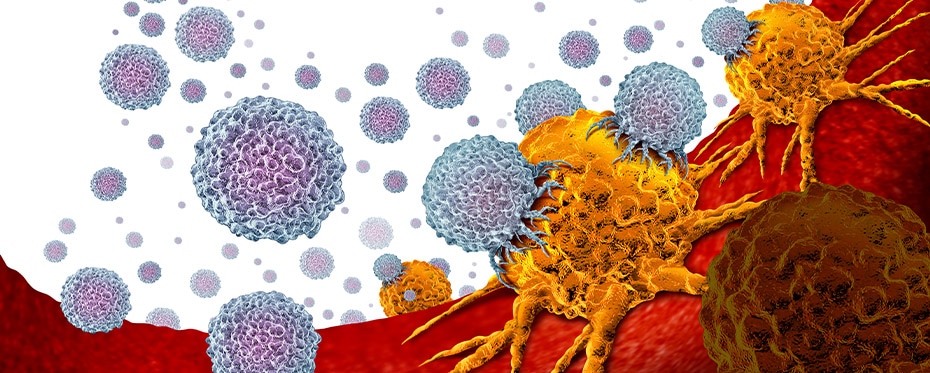Tag: Immunotherapy
Nanoparticles as Trojan horses: A safe and effective way to deliver oncolytic viruses to treat all cancers

Advanced cancer often comes with a lack of treatment options. Immunotherapies like cancer-killing viruses – oncolytic viruses (OVs) – are becoming increasingly popular but are currently limited by their inability to be administered into the blood. However, Dr Faith Howard and Dr Munitta Muthana, researchers at the University of Sheffield in the UK, demonstrate that OVs can be injected into […]
Simple blood tests could predict immunotherapy effectiveness

Despite the extensive use of immunotherapy in patients suffering from head and neck squamous cell carcinoma, this therapy has significant limitations. Not everyone responds to treatment and current therapies can have serious adverse side effects. When working at the Johns Hopkins School of Medicine, Sidney Kimmel Comprehensive Cancer Center, USA, Dr George Laliotis and his team discovered that biochemical factors, measured […]
Read More… from Simple blood tests could predict immunotherapy effectiveness
Probing Cancer: Immunotherapy and Molecular Imaging

The Singapore-based Cancer ImmunoTherapy Imaging (CITI) programme is a Singapore-wide collaborative research group, comprising 12 research institutes. CITI’s efforts are focused on the discovery and application of peptide-based imaging probes, which target immunotherapy treatment response biomarkers. Dr Edward G Robins, Head of Radiochemistry at the Singapore Bioimaging Consortium and Deputy Director of the NUS Clinical Imaging Research Centre, alongside his […]
Read More… from Probing Cancer: Immunotherapy and Molecular Imaging
A new weapon to boost cancer immunotherapy

In recent years, immunooncology has paved new avenues for effective treatment across cancer types. In addition to cytotoxic chemotherapy, we can now harness the power of the human immune response against malignant cells. However, immunotherapy is not perfect, and as always, cancer has mechanisms to evade these attacks. Dr Svetlana Hamm, Head of Research and Translational Medicine at 4SC in […]
Off-the-shelf immunotherapy could lead to more accessible cancer treatment

Immunotherapy is a type of cancer treatment that harnesses the immune system to destroy cancerous cells. Dr Li Zhang and colleagues at Toronto General Hospital Research Institute and the University of Toronto, are pioneering a new type of “off-the-shelf” treatment using a type of immune cell—a double negative T (DNT) cell. Dr Zhang‘s work shows that DNT cells are a […]
Read More… from Off-the-shelf immunotherapy could lead to more accessible cancer treatment
Reprogramming the immune system for personalised immunotherapy against cancer

For decades, researchers have strived to understand how the immune system recognises and fights cancer, ultimately aiming to exploit and augment these processes to create more effective cancer therapies. Dr Richard Koya, Associate Professor of Oncology, Associate Director of the Center for Immunotherapy, and Director of the Vector Development & Production Facility at Roswell Park Cancer Institute is a prominent […]
Read More… from Reprogramming the immune system for personalised immunotherapy against cancer